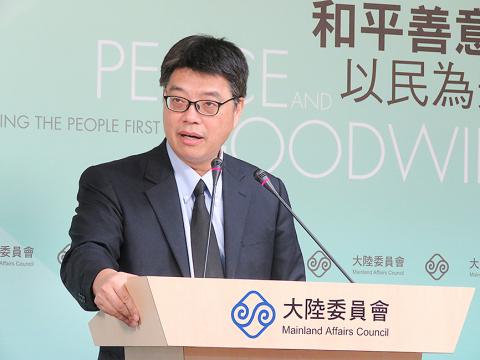The Mainland Affairs Council (MAC) yesterday warned Taiwanese living in China of a potential risk of government surveillance, after Beijing announced that it would allow people from Taiwan, Hong Kong and Macau to apply for residence permits starting on Sept. 1.
Taiwanese, Hong Kongers and Macanese who have lived in China for more than six months and are legally working, living or studying in the country would have the option of applying for a residence permit, the Chinese State Council Information Office announced at a news conference in Beijing yesterday.
They would be able to receive the permit 20 business days after submitting an application by taking a valid travel permit to their local public security agency, Chinese Deputy Minister of Public Security Shi Jun (侍俊) said.

Photo: CNA
Taiwanese do not need to have permanent resident status in China or give up their permanent resident status in Taiwan to apply for the permit, China’s Taiwan Affairs Office Deputy Director Long Mingbiao (龍明彪) said.
The rights and obligations they have in Taiwan would not be affected, he said.
The residence permit would be used to prove the identities of Taiwanese, Hong Kongers and Macanese in China, Long said.
It would adopt the same technical standards used in the production of Chinese resident identity cards and use an 18-digit identification number to ensure compatibility with all identification card readers in the Chinese public service system, he said.
The resident permit cannot be used to enter or exit China, Long said, adding that the Mainland Travel Permit for Taiwan Residents is the only travel document Taiwanese can use to enter or exit China.
MAC Deputy Minister and spokesperson Chiu Chui-cheng (邱垂正) called the move a part of China’s “united front” strategy of giving Taiwanese equal treatment to Chinese citizens.
Along with 31 measures for Taiwanese hoping to work or study in China, the equal treatment Beijing gives Taiwanese residents and Chinese citizens in some provinces and cities is part of China’s “united front” tactics, he said.
China currently issues temporary residence permits to Taiwanese living in China, he added.
The council would look into the difference between the temporary residence permit and the residence permit, as well as whether there is a substantial difference between obtaining the residence permit and registering a household in China after the details of the regulations are announced, Chiu said.
Over the past few years, Beijing has been creating its “Skynet Project,” which uses surveillance cameras to monitor the movements of people and vehicles, he said.
Through the surveillance system, Beijing might already possess the facial recognition records of more than 1 billion people, he added.
As soon as it identifies someone who has challenged social order, the system activates its surveillance and tracking devices, and uses automatic facial recognition technology to record the incident, Chiu said, adding that the system also incorporates a social credit system to monitor the public.
Taiwanese who wish to work or study in China should beware of the potential risks involved with obtaining a residence permit, he said.
The council believes that Taiwanese studying or working in China all cherish the experience of growing up in Taiwan’s democratic and free environment, and that China’s “united front” strategy of issuing resident permits would not affect their love and sense of identity toward Taiwan, he added.

Taiwan is stepping up plans to create self-sufficient supply chains for combat drones and increase foreign orders from the US to counter China’s numerical superiority, a defense official said on Saturday. Commenting on condition of anonymity, the official said the nation’s armed forces are in agreement with US Admiral Samuel Paparo’s assessment that Taiwan’s military must be prepared to turn the nation’s waters into a “hellscape” for the Chinese People’s Liberation Army (PLA). Paparo, the commander of the US Indo-Pacific Command, reiterated the concept during a Congressional hearing in Washington on Wednesday. He first coined the term in a security conference last

A magnitude 4.3 earthquake struck eastern Taiwan's Hualien County at 8:31am today, according to the Central Weather Administration (CWA). The epicenter of the temblor was located in Hualien County, about 70.3 kilometers south southwest of Hualien County Hall, at a depth of 23.2km, according to the administration. There were no immediate reports of damage resulting from the quake. The earthquake's intensity, which gauges the actual effect of a temblor, was highest in Taitung County, where it measured 3 on Taiwan's 7-tier intensity scale. The quake also measured an intensity of 2 in Hualien and Nantou counties, the CWA said.

The Overseas Community Affairs Council (OCAC) yesterday announced a fundraising campaign to support survivors of the magnitude 7.7 earthquake that struck Myanmar on March 28, with two prayer events scheduled in Taipei and Taichung later this week. “While initial rescue operations have concluded [in Myanmar], many survivors are now facing increasingly difficult living conditions,” OCAC Minister Hsu Chia-ching (徐佳青) told a news conference in Taipei. The fundraising campaign, which runs through May 31, is focused on supporting the reconstruction of damaged overseas compatriot schools, assisting students from Myanmar in Taiwan, and providing essential items, such as drinking water, food and medical supplies,

New Party Deputy Secretary-General You Chih-pin (游智彬) this morning went to the National Immigration Agency (NIA) to “turn himself in” after being notified that he had failed to provide proof of having renounced his Chinese household registration. He was one of more than 10,000 naturalized Taiwanese citizens from China who were informed by the NIA that their Taiwanese citizenship might be revoked if they fail to provide the proof in three months, people familiar with the matter said. You said he has proof that he had renounced his Chinese household registration and demanded the NIA provide proof that he still had Chinese